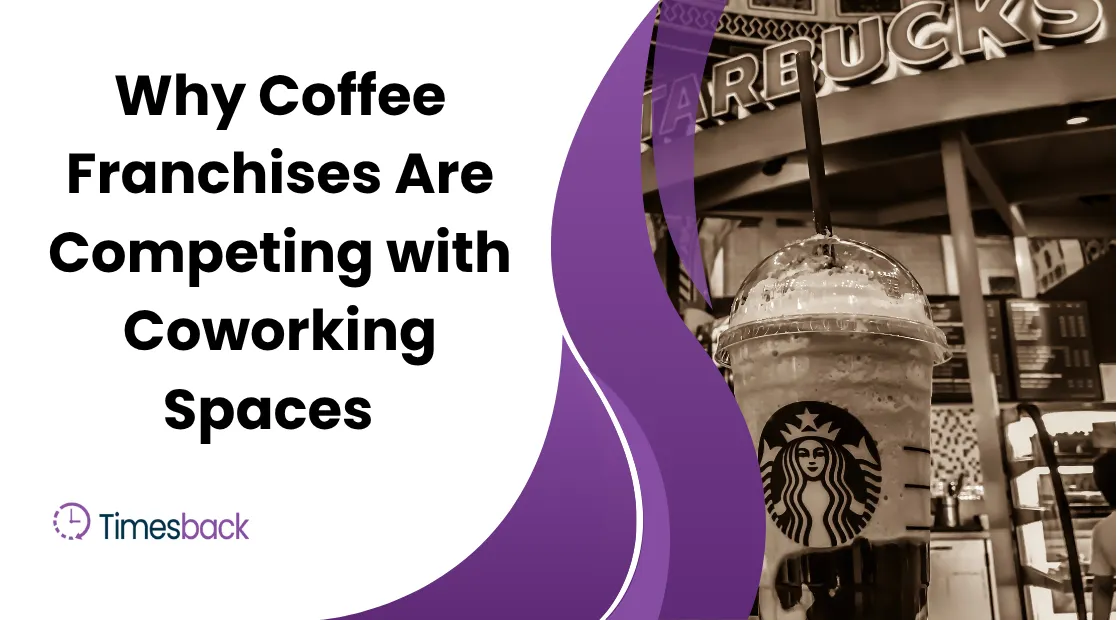Por qué las franquicias de café compiten con los espacios de coworking

Coffee franchises have long been synonymous with quick caffeine fixes and cozy corners for casual meetups, but a new trend is brewing: they’re evolving into formidable rivals to coworking spaces.
Anuncios
This shift isn’t just about serving lattes; it’s a strategic pivot driven by changing consumer behaviors, economic pressures, and the rise of remote work.
As professionals seek flexible, community-driven workspaces, coffee franchises are stepping up, blending the allure of artisanal brews with the functionality of modern offices.
But why are these caffeine hubs encroaching on territory once dominated by coworking giants like WeWork?
Anuncios
Let’s dive into the dynamics fueling this competition, exploring how coffee franchises are redefining their role in the modern work landscape.
The Rise of the Hybrid Work Culture
The traditional office is no longer the default.
Since the pandemic, hybrid work has reshaped how and where people work.
A 2023 Gallup study found that 60% of U.S. workers prefer hybrid arrangements, splitting time between home, office, and third spaces.
Coffee franchises, with their widespread locations and inviting atmospheres, are capitalizing on this shift.
Unlike sterile coworking spaces, these venues offer a sensory experience—think the aroma of freshly ground beans and the hum of conversation—that makes work feel less like a grind.
Picture Sarah, a freelance graphic designer in Chicago.
She used to rent a desk at a coworking space, but the $300 monthly fee felt steep for sporadic use.
Now, she camps out at a local coffee franchise, Brew & Work, which offers free Wi-Fi, ample outlets, and a loyalty program that rewards her frequent visits with free drinks.
For the price of a $5 latte, she gets a vibrant workspace and a community vibe.
Coffee franchises are betting on customers like Sarah, transforming their spaces to cater to professionals craving flexibility without the hefty price tag.
Moreover, as remote work continues to gain traction, coffee franchises are likely to adapt further by enhancing their offerings and creating more tailored experiences for their clientele.
+ Franquicia en un centro comercial vs. en la calle: Análisis de costo-beneficio
Redesigning Spaces for Productivity
Walk into a modern coffee franchise, and you’ll notice a departure from the cramped tables of yesteryear.
Chains are investing in layouts that prioritize work.
Spacious seating, soundproof booths, and high-speed internet are becoming standard.
Some even offer reservable meeting rooms, a feature once exclusive to coworking spaces.
This isn’t just about aesthetics—it’s a calculated move to capture the remote work market.
Consider the layout of a hypothetical coffee franchise, Java Junction.
Its flagship location in Seattle features ergonomic chairs, standing desks, and private nooks with noise-canceling panels.
These design choices aren’t random; they’re tailored to professionals who need focus without isolation.
By contrast, coworking spaces often charge premium rates for similar amenities, making coffee franchises an attractive, budget-friendly alternative.
| Característica | Coffee Franchise (e.g., Java Junction) | Coworking Space (e.g., WeWork) |
|---|---|---|
| Costo | $5-$10/day (drink purchase) | $200-$500/month |
| Wi-Fi | Free, high-speed | Included in membership |
| Meeting Rooms | Reservable, $10-$20/hour | Included or additional fee |
| Ambiance | Casual, social | Professional, corporate |
This table highlights why coffee franchises are gaining ground: affordability and accessibility.
While coworking spaces cater to long-term commitments, coffee franchises offer a pay-as-you-go model that aligns with the gig economy’s fluidity.
Additionally, as these spaces continue to innovate, they may incorporate more technology-driven solutions to further enhance productivity for their customers.
Community as a Competitive Edge
What sets coffee franchises apart isn’t just their physical upgrades but their ability to foster community.
Coworking spaces promise networking, yet their sterile environments can feel transactional.
Coffee shops, by contrast, thrive on organic interactions.
Baristas remember your name, regulars strike up conversations, and the space feels alive.
This sense of belonging is a magnet for freelancers, entrepreneurs, and remote workers who crave connection without formality.
Take the example of Brew & Work’s “Freelancer Fridays,” a weekly event where local professionals share skills over coffee.
A copywriter might swap tips with a web developer, sparking collaborations that rival the curated networking events of coworking spaces.
This community-driven approach is like a warm campfire in a digital age—inviting, inclusive, and hard to replicate in a corporate setting.
But can coffee franchises truly replace the structured networking of coworking spaces?
The answer lies in their adaptability.
By hosting events like workshops or pitch nights, they’re creating ecosystems where work and socializing blur, offering a value proposition that feels less like a membership and more like a lifestyle.
As these community events grow in popularity, coffee franchises may find themselves becoming essential hubs for local professionals looking to expand their networks.

Economic Incentives and Scalability
From a business perspective, coffee franchises are playing a smart game.
Coworking spaces rely on long-term leases and high overhead, which can lead to financial strain—WeWork’s 2020 near-collapse is a case in point.
Coffee franchises, however, operate on a leaner model.
Their core revenue comes from food and beverage sales, meaning workspace amenities are an add-on, not the primary cost driver.
This allows them to scale without the financial risks that plague coworking giants.
The economics are compelling.
A coffee franchise can convert a single location into a hybrid workspace for a fraction of the cost of opening a coworking space.
Add to that the brand loyalty built through loyalty programs and subscription models—some chains now offer “work passes” for unlimited coffee and Wi-Fi—and you have a recipe for sustained growth.
These passes, often priced at $50-$100/month, undercut coworking memberships while ensuring steady foot traffic.
| Modelo de negocio | Coffee Franchise | Coworking Space |
|---|---|---|
| Primary Revenue | Food & Beverage Sales | Membership Fees |
| Overhead Costs | Moderate (shared with cafe operations) | High (dedicated office spaces) |
| Escalabilidad | High (existing locations) | Moderate (new leases required) |
| Customer Commitment | Flexible (daily or subscription) | Long-term contracts |
This table underscores the economic agility of coffee franchises.
Their ability to pivot without overhauling their core business gives them a competitive edge in a volatile market.
Furthermore, as they continue to innovate their business models, coffee franchises may find new revenue streams that further enhance their financial stability.
++ Por qué revender franquicias puede ser mejor que empezar desde cero
The Role of Technology
Technology is another battleground where coffee franchises are holding their own.
Many now offer apps for pre-ordering drinks, reserving tables, or even booking meeting rooms, streamlining the user experience.
These tools mirror the tech-driven convenience of coworking spaces but at a lower cost.
For instance, Java Junction’s app lets users check real-time table availability, a feature that rivals the booking systems of high-end coworking spaces.
Moreover, coffee franchises are leveraging data to refine their offerings.
By tracking peak hours and customer preferences, they optimize seating arrangements and staff schedules to accommodate workers.
This data-driven approach ensures they meet demand without overextending resources, a flexibility coworking spaces struggle to match due to their rigid infrastructure.
As technology continues to evolve, coffee franchises will likely adopt even more sophisticated tools to enhance customer experience and operational efficiency.

The Social Media Buzz
Social media is amplifying this trend.
Coffee franchises are inherently Instagrammable—think latte art and cozy interiors—which gives them a marketing edge over utilitarian coworking spaces.
TikTok and Instagram are flooded with posts from remote workers showcasing their “office of the day” at local coffee shops.
This organic promotion builds brand visibility and attracts a younger demographic that values aesthetics as much as functionality.
For example, a viral TikTok trend in 2024 featured freelancers sharing “day in the life” videos at coffee franchises, highlighting how they balance work and leisure.
This kind of user-generated content is gold for brands, driving foot traffic without the hefty ad budgets required by coworking spaces.
It’s a virtuous cycle: the more professionals use these spaces, the more they’re showcased online, drawing in new customers.
To further explore how social media shapes consumer behavior, check out Sprout Social, a platform that provides insights into the latest social media trends and strategies.
Challenges and Limitations
Of course, coffee franchises aren’t without hurdles.
Noise levels can be a drawback for tasks requiring deep focus, and seating isn’t always guaranteed during peak hours.
Coworking spaces, with their dedicated desks and quiet zones, still hold an edge for certain professionals.
Additionally, coffee franchises must balance the needs of casual customers with those of long-stay workers, which can strain staff and resources.
Yet, these challenges are spurring innovation.
Some franchises are experimenting with “quiet hours” or dedicated work zones to address noise concerns.
Others are partnering with local businesses to offer perks like discounted gym memberships or tech support, sweetening the deal for remote workers.
These adaptations show that coffee franchises are not just reacting to trends but actively shaping them.
As they continue to innovate, coffee franchises may find new ways to enhance the customer experience while addressing the unique challenges they face.
The Future of Workspaces
Looking ahead, the lines between coffee franchises and coworking spaces will likely blur further.
As remote work becomes a permanent fixture, the demand for affordable, flexible workspaces will only grow.
Coffee franchises are uniquely positioned to meet this demand, combining the warmth of a cafe with the utility of an office.
They’re not just competing with coworking spaces—they’re redefining what a workspace can be.
Imagine a future where your local coffee franchise doubles as a hub for innovation, collaboration, and community.
It’s not far-fetched.
With their economic resilience, technological savvy, and knack for fostering connection, these chains are brewing a revolution in how we work.
So, the next time you grab a latte, ask yourself: is this just a coffee shop, or the future of work?
As the landscape of workspaces continues to evolve, coffee franchises may just lead the way in creating a more integrated and dynamic work environment.
